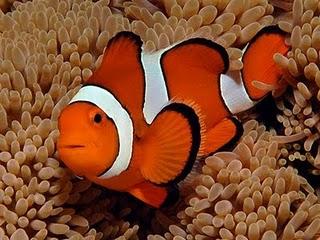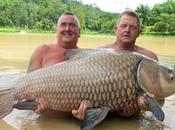
Il pesce pagliaccio, quello reso famoso dal film 'Alla ricerca di Nemo', potrebbe essere fra quelli piu' colpiti dall'acidificazione delle acque provocata dall'aumento della CO2 atmosferica. Secondo un articolo pubblicato dalla rivista Biology Letters il pH che si raggiungera' nei prossimi decenni rende infatti questo pesce sordo, impedendogli di percepire i predatori.
L'analisi e' stata fatta dai ricercatori dell'universita' di Bristol, che hanno fatto nuotare un gruppo di pesci pagliaccio giovani in quattro vasche, una con il livello di acidita' attuale di 390 ppm e le altre con 600, 700 e 900 ppm, le quantita' cioe' che si dovrebbero raggiungere in questo secolo. Su un lato della vasca era posto un altoparlante con il rumore prodotto dai tipici predatori della barriera corallina.
Nel primo caso i pesci hanno passato tre quarti del tempo dal lato opposto della vasca rispetto ai 'predatori', mentre negli altri non hanno mostrato preferenze: "Quello che abbiamo fatto e' mettere questi pesci nell'ambiente di domani - spiegano i ricercatori - e le conseguenze sono devastanti. Il sistema uditivo dei pesci non e' danneggiato, ma non e' chiaro cosa provochi il disorientamento, forse qualche effetto sui nervi che stiamo cercando di capire".
Buona Giornata
Roberto
The clown fish, the one made famous by the movie 'Finding Nemo', could be among those most 'affected by acidification of water caused by increased atmospheric CO2. According to an article published in the journal Biology Letters that the pH will be reached 'in the coming decades makes it this fish deaf, making it impossible to perceive predators.
And analysis' was done by researchers at the University 'of Bristol, who did swim a group of young clown fish in four tanks, one with the level of acidity' current 390 ppm and the other with 600, 700 and 900 ppm, the amount 'that is' you should reach in this century. On one side of the tank was placed a speaker with the noise produced by typical predators of the reef.
In the first case, the fish spent three quarters of the time on the opposite side of the tank than the 'predators', while the other showed no preferences: "What we have done and' put these fish into the environment of tomorrow - the researchers - the consequences are devastating. The auditory system of fish is not 'damaged, but not' clear what causes the confusion, perhaps some effect on the nerves that we are trying to figure out. "
Good Day
Roberto





